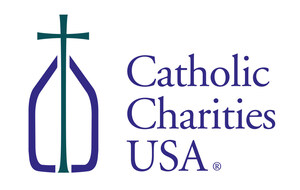
Catholic Charities offers tips for helping after disaster
ALEXANDRIA, Va., May 25, 2011 /PRNewswire-USNewswire/ -- The morning after the news broke of the destruction in Joplin, Missouri, the phones at Catholic Charities of the Diocese of Baton Rouge (CCDBR) started ringing.
(Logo: http://photos.prnewswire.com/prnh/20081008/CCUSALOGO)
"We aren't surprised that people in Louisiana want to help," said David Aguillard, CCDBR Executive Director.
The people of South Louisiana are traditionally known for being some of the most generous in the country. Since the outpouring of support for the state after Hurricane Katrina, that tradition has grown even stronger.
"Catholic Charities is known for rolling up our sleeves, testing lessons learned from past disasters and buckling down for the hard work of helping people to rebuild their lives," said Aguillard.
"It's heartwarming to receive support from all over the country," said Carol Spruell, CCDBR Communications Coordinator, who is frequently deployed to help other Catholic Charities USA member agencies respond on their home turf. "We could not do the work we do without those financial donations, volunteers and material goods."
"Financial donations are always our first preference if people far away want to help," said Aguillard. "In the first few weeks, we rely 100% on donations and grants to purchase relief supplies, buy gas cards and fill the gaps in services."
"A lot of people's first instinct is to clean out their closets and send us their used clothing," said Spruell, "but those donations consume volunteer time and precious warehouse space."
When a disaster leaves the front page news, offers to help subside and donations slow to a trickle.
"When the national news crews leave, that's really when the hard work begins," said Aguillard. "The needs are often greater months after a disaster. FEMA and insurance settlements can only go so far for people who have lost everything."
"Keep the buzz going by using social media to update your friends and keep the story alive," said Spruell. "In recent years, sites like Facebook and Twitter have evolved the way agencies like Catholic Charities respond and connect with donors."
"We know people want to help and that's part of our mission--engaging the community in our work," said Spruell. "Often it's just a matter of educating the public on what our needs and limitations are."
The Catholic Charities staff put together some tips for people considering how to help:
- Donate money--Financial donations are always the best choice. While clicking a "donate now" button doesn't give a sense of action, the funds support the operations on the ground. Also, with cash donations agencies can buy locally infusing money into the local economy and take advantage of bulk pricing on some relief supplies. How do you know who to give to? Here are some tips you might not have thought about:
- Do your homework. Before you write a check, find out what percentage of your donations will actually be used in this disaster. How much does the organization spend on administration costs? What's the agency's track record? Find out at sites like http://www.charitynavigator.org/ or http://www2.guidestar.org/.
- A large percentage of donations pour in while the disaster is front page news. Do your research and find out what organizations are in the game for the long haul and involved in the rebuilding phase—helping people find jobs, new housing or providing mental health counseling.
- Collect relief supplies—People often want to organize a collection drive after any disaster. And sometimes, those items are helpful, but there are a few things you should consider.
- Before collecting relief supplies, find out if there is an agency that can accept them.
- Remember, the disaster landscape changes quickly, so act quickly. If an agency needs water today, they may not necessarily need water tomorrow. Social media sites like Facebook have up-to-date postings of needed supplies. Factor in shipping costs if you're not planning on delivering your donations yourself.
- If you want to send clothing, new clothing is always the best choice (especially jeans, t-shirts, shoes and underwear). Make sure there is an agency to accept them in the affected area. Yes, people who have lost everything will be grateful for whatever help they can get, but a brand new pair of socks would be top on most people's list.
- Host a shower, just like you would for a new bride. Ask your friends to donate everything a family would need to set up housekeeping—pots, pans, linens, even furniture. Make sure you know how the items will get to the affected area. Don't expect a local agency to foot the shipping bill to send your items across the country.
- Gift cards are a great way agencies can quickly get assistance to survivors. Gas, groceries, baby supplies are items families need following any emergency.
- Donate your bank of frequent flyer miles or loyalty reward points to a disaster responder. Don't let your hard-earned points expire. Help out an agency with airfare, hotel rooms or even meals. Each reward program's donation policy varies, so check online. It's a win/win for everyone.
- Volunteer—The work after any disaster is overwhelming, and volunteer offers come in from every part of the world. Here are some things to remember:
- If you're thinking of traveling to another part of the country to help out, make a connection on the ground before you pack your bags. Never show up unannounced and without a game plan. Make sure your help is needed, and prepare to be "self-sufficient." In any disaster environment, hotels are booked for miles, restaurants packed, and rental cars in short supply. Nonprofit staff will be focused on relief and recovery, not on taking care of you.
- Register and train before disaster strikes. Get on a deployment list, and wait for the phone to ring.
- Register with http://www.handsonnetwork.org/ or a local volunteer agency.
- Spread the word through social media.
- Update your friends on the crisis situation, solicit donations and keep the buzz going. Successes come from connecting needs with people and companies that can help. You never know what might happen if the right person reads your tweet about an organization needing diapers or a Facebook post you share about a family who lost everything.
- New applications are evolving every day to help out in disaster. You could lend your computer skills to an agency on the other side of the world by helping them to keep their website updated with current information and needs. For the creative uber-techie folks, volunteer with a cutting-edge crowd like http://crisiscommons.org/, a group putting a spin on how information in disasters is managed through mapping and information management.
For more information about Catholic Charities USA visit www.catholiccharitiesusa.org.
Catholic Charities USA's members provide help and create hope for more than 9 million people a year regardless of religious, social, or economic backgrounds. For almost 300 years, Catholic Charities agencies have worked to reduce poverty by providing a myriad of vital services in their communities, ranging from health care and job training to food and housing. In 2010, Catholic Charities USA celebrated its centennial anniversary and introduced new federal legislation – the National Opportunity and Community Renewal Act (NOCRA) – to transform the nation's approach to poverty.
SOURCE Catholic Charities USA





Share this article